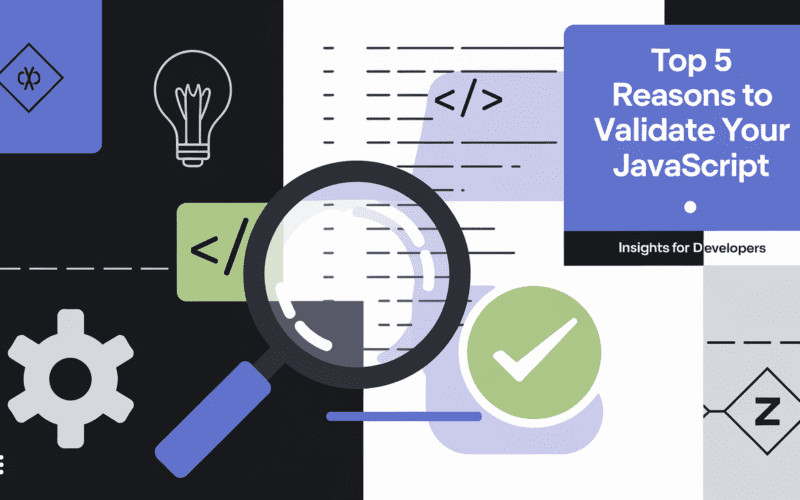Summary: The article states the top five reasons to validate your JavaScript to make it comply with Wide Web Consortium (W3C) standards. It is essential to validate JavaScript so that it is easy to debug and future-proof your code. You can validate your javascript by using a Java Validator tool.
Introduction
Validating JavaScript code is like proofreading a document to ensure it follows proper grammar rules. Keep in mind grammar analogy when thinking of validating your code.
Just as grammar ensures clear communication, code validation ensures your JavaScript functions are as intended and stick to recognised standards.
It might seem like an extra step, but it significantly ensures your website or application performs reliably.
So, why is JavaScript validation important? How can it benefit developers of all experience levels? What are ways to validate JavaScript? Read this detailed guide to learn all this!
What Does It Mean to Validate JavaScript?
Validating JavaScript means reviewing JavaScript code to see if it complies with the World Wide Web Consortium (W3C) standards.
W3C standards are predefined best practices or principles for writing code in web development. These standards make writing code clean, faster, and easy to maintain.
Ultimately, validation is simply a tool that helps you code better.
For JavaScript, validation involves checking:
- Syntax errors: missing brackets, semicolons, or incorrect use of operators.
- Structural mistakes: poorly written functions or incorrect variable declarations.
- Compatibility: ensuring the code works across different browsers and platforms.
Validation doesn’t just highlight errors. It also ensures that your code can handle browser updates, prevents unexpected behaviour, and simplifies maintenance.
Why Should You Validate Your Code?
The following are reasons you should validate your code:
Debugging Made Easier
Errors in your JavaScript can cause significant problems. For example, broken functionality, incorrect user interface behaviour, or even complete application failure.
Debugging is a time-consuming process, but validation tools can make it much simpler.
Suppose a webpage where a button doesn’t trigger the intended action. A validation tool can reveal that the function is missing parentheses or a closing bracket, which would otherwise take hours to identify manually.
Validators pinpoint errors in the code when debugging—they highlight specific lines of code where errors occur. This saves time and makes it easy to manually sift through hundreds of lines.
Small errors can be present even if a code seems to work. Interestingly, code validators can help programmers catch unnoticed problems.
Future-Proofing Your Code
The web evolves constantly. New browsers, devices, and frameworks are introduced regularly, and older versions are updated or retired.
Validation ensures your code aligns with current standards set by W3C. This makes the code more likely to stay functional in the future.
While temporary fixes or non-standard code might work today, it could break tomorrow with browser updates. Therefore, it is necessary to validate the code to make it adapt better to new browser versions or features.
In addition, well-written code (already compatible with updated technologies) saves future developers (or even you) from rewriting large portions of code.
A Great Learning Tool
Validation tools don’t just point out errors; they teach you how to code better.
Fixing the highlighted errors teaches you much about how to code a web page in the best way possible. Doing so helps you learn to code properly in the long run.
Some validators even suggest corrections along with an explanation. You can use such validators to understand why it’s an issue and how to fix it.
This is especially helpful for beginners. They can learn the dos and don’ts of coding by fixing validation errors. They naturally learn to write efficient and clean code by adhering to standards.
Easier Maintenance
Maintaining code is often harder than writing it.
Poorly written code can be difficult to decipher and update when you or someone else revisits a project after weeks, months, or even years.
Validating your code ensures it meets the standards accepted by the development community. This makes the code clean, organized, and easy to work with.
There are a few advantages of well-written code:
- It is easier to understand, update, and troubleshoot
- Other developers can easily grasp the logic and structure of the code
- No validation issues mean no long-term problems
So, suppose a company hires a new developer to update their website.
The new developer can make changes efficiently if the original code is clean and validated. If not, they might spend hours unravelling poorly written code.
A Mark of Professionalism
Writing validated code means attention to detail and a commitment to quality. While most users won’t check or care about your code’s validity, it reflects well on you as a developer.
When you write validated, professional code, clients and stakeholders can trust you to deliver reliable, high-quality work. You have more chances to get repeat customers/clients.
Clean, validated code is a mark of expertise and dedication. Employers and peers notice when you consistently follow best practices.
How Can You Validate JavaScript?
The best way to do this is to use the JS Validator tool to validate your JavaScript code.
A JavaScript Validator makes it easy to debug and improve your JavaScript scripts. It provides a detailed report on syntax errors, warnings, and possible issues in your code.
All you need to do is paste your code into the input box and click on the ‘Validate’ button. The tool will generate a detailed report in a few seconds.
Go through each error and make the relevant changes in the code to correct it. Once you are done with all the changes, check the code again.
Repeat the process until you get a refined piece of JavaScript code.
Conclusion
Validating JavaScript is essential for writing efficient, reliable, and future-proof code.
It simplifies debugging, helps identify unnoticed errors, and ensures compatibility with the latest web standards. Validation is also a great learning tool, teaching developers to write clean and maintainable code.
It makes future updates easier, saving time and effort for current and future developers. Validated code reflects professionalism and builds trust with clients and stakeholders.
Tools like JavaScript Validators help complete the validation process.




